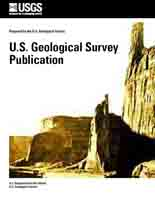Biosolids, soils, ground-water, and streambed-sediment data for a biosolids-application area near Deer Trail, Colorado, 1999
Links
- More information: Publisher Index Page (html)
- Download citation as: RIS | Dublin Core
Abstract
Suggested Citation
Stevens, M.R., Yager, T., Smith, D.B., and Crock, J., 2003, Biosolids, soils, ground-water, and streambed-sediment data for a biosolids-application area near Deer Trail, Colorado, 1999: U.S. Geological Survey Open-File Report 2002-51, v, 118 p. : ill., maps ; 28 cm., https://doi.org/10.3133/ofr0251.
ISSN: 2331-1258 (online)
| Publication type | Report |
|---|---|
| Publication Subtype | USGS Numbered Series |
| Title | Biosolids, soils, ground-water, and streambed-sediment data for a biosolids-application area near Deer Trail, Colorado, 1999 |
| Series title | Open-File Report |
| Series number | 2002-51 |
| DOI | 10.3133/ofr0251 |
| Year Published | 2003 |
| Language | ENGLISH |
| Description | v, 118 p. : ill., maps ; 28 cm. |


